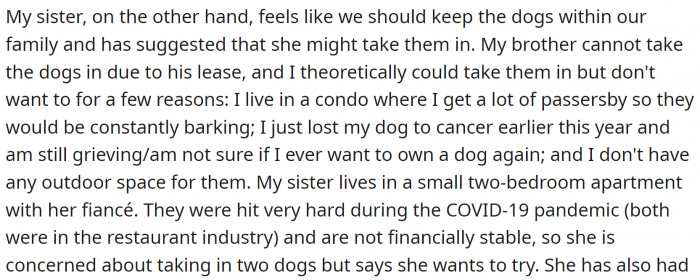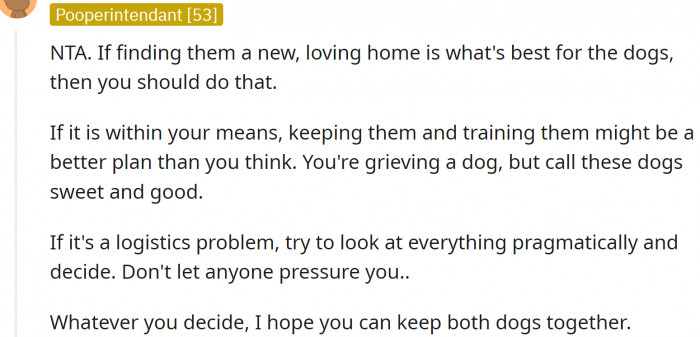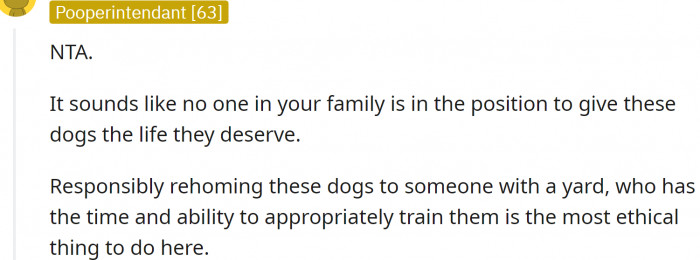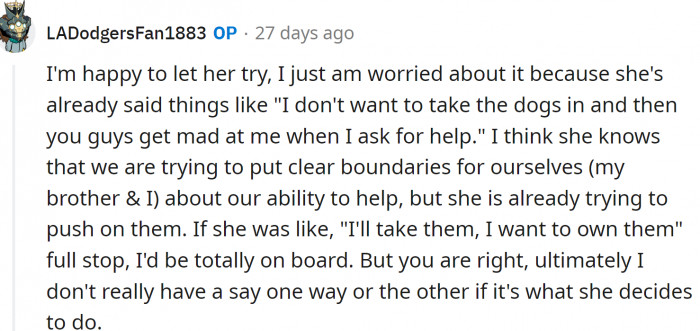Redditor Wants To Rehome Mom’s Dogs Because She Is Going To Rehab, But Their Sister Won’t Let Them
What should be done with dogs when their owners can no longer take care of them? Well, there is not much choice—rehoming them would be the best option.
When the dog owner has family who can take the dogs in, it usually helps. But what should be done when the family doesn’t want to? One Redditor shared their problem:
“My mom is an addict who has recently relapsed (a few times), and she owns two mid-sized dogs—one is 8 and one is 5. They are super sweet, loving dogs that have had very little training and have lived their entire lives in houses with yards.
My mom can no longer take care of these dogs—she is going into an inpatient rehab facility and can frankly barely take care of herself, let alone these two sweet pups.”
OP has two adult siblings—a younger sister and a younger brother. OP and their brother think that it would be best for the dogs if they found them a new home with a yard.
OP can imagine that rehoming dogs is not easy, but they feel that the dogs would be best suited to live in an environment similar to the one in which they were raised. They are also very untrained, bark constantly, and are not used to being taken on walks.
OP’s sister, on the other hand, feels that they should keep the dogs within the family and has suggested that she might take them in. OP and their brother cannot take the dogs in due to his lease, and OP has a tiny apartment.
There is another reason OP doesn’t want the dogs: “I just lost my dog to cancer earlier this year and am still grieving; I am not sure if I ever want to own a dog again, and I don't have any outdoor space for them. My sister lives in a small two-bedroom apartment with her fiancé.
They were hit very hard during the COVID-19 pandemic (both were in the restaurant industry) and are not financially stable, so she is concerned about taking in two dogs but says she wants to try.”
But the sister is short on cash and couldn’t take care of the dogs properly. Additionally, she has never had a dog, so she doesn’t really know what she is getting into.
Read the interesting story below:
OP asks:

Their mom is an addict, and going into rehab:

And her dogs need a home

Family Dynamics and Responsibility
Family systems theory suggests that individuals often have deeply entrenched roles within their families, shaped by past experiences and dynamics. In this case, the siblings’ refusal to rehome the dogs may reflect a strong sense of loyalty and responsibility, indicative of their position in the family hierarchy. Research indicates that these roles can significantly influence decision-making processes, especially in emotionally charged situations.
Understanding these dynamics can help family members navigate conflicts with greater empathy and clarity.
Family Dynamics and Pet Ownership
Dr. Jessica Moore, a family therapist, explains that pets often become integral parts of family dynamics, creating emotional attachments that complicate decisions about their care.
Her research indicates that when family members disagree about pet care, it can lead to heightened tensions and emotional stress.
Studies suggest that pets are often viewed as family members, and decisions regarding them can evoke strong emotional responses, as outlined in research published in the Journal of Family Psychology.
While OP and their brother want to rehome them, their sister wants to keep them in the family

OP doesn't know what to do

Sister doesn't know anything about dogs

Emotional responses in family disagreements can often lead to heightened tensions. Studies on family conflict resolution reveal that unresolved issues from the past tend to resurface in current disputes, exacerbating feelings of resentment and frustration. This situation is a prime example of how past experiences can shape present reactions, making it essential for family members to communicate openly about their feelings and concerns.
Conflict over pet care responsibilities can reveal underlying family dynamics, such as sibling rivalry or differing values regarding animal welfare. Often, individuals may project their own feelings of inadequacy or fear onto these discussions, complicating the decision-making process.
Psychological research emphasizes that these conflicts can be exacerbated by unresolved tensions or differing expectations about familial roles.
Understanding these dynamics can help family members navigate their disagreements with greater empathy and clarity.
Including the cost of having one (two in this case)

Redditors agree

Maybe they could split them?

The Role of Boundaries in Family Relationships
Establishing healthy boundaries is crucial in family relationships, particularly when it comes to shared responsibilities. According to research published in the Journal of Family Psychology, clear boundaries help individuals navigate conflicts more effectively and maintain their emotional well-being. In this case, the sibling's insistence on keeping the dogs may be a way of asserting their boundaries, which can sometimes be perceived as selfishness by others.
Encouraging open dialogue about responsibilities and expectations can help clarify intentions and reduce misunderstandings.
The Emotional Weight of Rehoming Pets
Rehoming pets can be an emotionally charged decision, often leading to feelings of guilt and anxiety for those involved.
Research indicates that the emotional burden of rehoming can be comparable to that of losing a family member, as pets often provide unconditional love and companionship.
A study reported in the Journal of Applied Animal Welfare Science illustrates that individuals may experience grief-like symptoms when faced with the prospect of rehoming a pet.
It does look like this:

It would be best if they could stay together

OP posted an update:

To foster healthier family dynamics, it may be beneficial to engage in family counseling or mediation. These professional interventions can provide a safe space for family members to express their feelings and work towards collaborative solutions. Research in family therapy indicates that structured conversations can lead to improved understanding and resolution of conflicts, enhancing the overall family atmosphere.
To ease the burden of rehoming decisions, family members should engage in open discussions about their feelings and concerns regarding the pets' future.
Experts recommend involving all family members in the decision-making process to ensure that everyone feels heard and validated.
According to studies in family therapy, engaging in collective decision-making can reduce feelings of guilt and foster a sense of shared responsibility.
Owning a dog takes a lot of time, responsibility, and money. If you are short on any of these, dog ownership is not for you. Since OP already had a dog, she knows what’s at stake, so she is cautious.
On the other hand, their sister has no idea what she is getting herself into. We really hope they will find a solution.
Managing Stress in Family Conflicts
Family conflicts surrounding pet care can lead to heightened stress levels, which can impact overall family dynamics.
Research suggests that unresolved stress can lead to poor communication patterns and increased emotional reactivity among family members, making it difficult to reach a resolution.
Experts recommend practicing stress management techniques, such as mindfulness or deep breathing exercises, to create a calmer environment for discussions.
Encouraging family members to express their emotions in a safe and supportive environment can help facilitate healthier communication.
Family therapists often suggest using 'I' statements to express feelings without placing blame, which can foster understanding and reduce defensiveness.
According to research published in the American Journal of Family Therapy, this approach can significantly improve family communication and cohesion.
Building Consensus on Pet Care Decisions
To reach a consensus on pet care decisions, families can benefit from creating a structured decision-making process.
Experts suggest outlining the pros and cons of various options, including involving a neutral third party if necessary, to help mediate discussions.
Research shows that structured decision-making can lead to more satisfactory outcomes for all parties involved.
Ultimately, recognizing that disagreements about pets can reflect deeper family dynamics can help members approach conflicts with greater sensitivity.
By fostering a culture of open communication and shared responsibility, families can navigate the complexities of pet ownership in a way that strengthens their bonds.
It's about working together to find solutions that prioritize both the well-being of the pets and the emotional health of the family.
Psychological Analysis
This situation highlights the complexities of familial relationships and the emotional weight of pet ownership. Disagreements can often reflect deeper issues within the family, making it essential to approach these discussions with empathy and understanding.
Encouraging open dialogue about the emotional implications of pet care can lead to more harmonious resolutions.
Analysis generated by AI
Analysis & Alternative Approaches
Understanding the psychological and emotional dynamics of family decisions regarding pets can help family members navigate conflicts more effectively.
By promoting open communication and shared responsibility, families can foster a supportive environment that benefits both pets and their caregivers.
Ultimately, addressing these conflicts with empathy can strengthen family ties and promote a healthier dynamic.
Navigating Emotional Conflicts
Emotional conflicts often arise when individuals feel their values or priorities are being challenged. According to emotional intelligence research, individuals who recognize and manage their emotions can navigate conflicts more successfully. In this case, acknowledging the emotional weight of the decision regarding the dogs could help family members approach the situation with greater empathy and understanding.
Developing emotional intelligence can significantly improve interpersonal relationships and conflict resolution skills.
Analysis & Alternative Approaches
Family dynamics play a crucial role in decision-making processes, particularly when emotions run high. Understanding the psychological principles at play can facilitate healthier discussions and resolutions. By fostering open communication and emotional intelligence, families can navigate challenges more effectively and strengthen their bonds.



